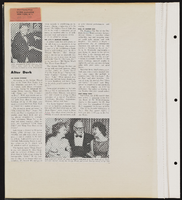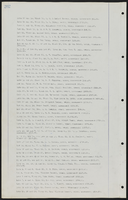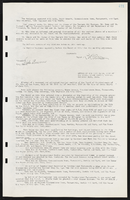Search the Special Collections and Archives Portal
Search Results
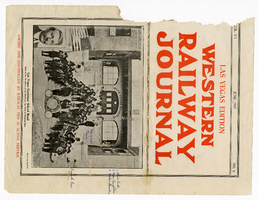
Newspaper, Western Railway Journal, June 1917
Date
Description
Text

Transcript of interview with Ruby Amie-Pilot by Barbara Tabach and Claytee White, August 7, 2012
Date
Archival Collection
Description
Ruby Amie-Pilot moved to Las Vegas in 1952. She worked at the Desert Inn in the kitchen, was the first African American full time sales person at Sears; she also worked as a window dresser with Hazel Gay, and later owned travel agency with Esther Langston. In the interview, Ruby discusses moving to the Westside, Jackson street and housing developments, education, and her experiences with local leaders.
Text
Matheson, Ken "K. D.": publication, 1996
Level of Description
Archival Collection
Collection Name: Dennis McBride Personal Papers
Box/Folder: Box 29 (Restrictions apply)
Archival Component
Aniello, Robert "Bob": correspondence, 1979
Level of Description
Archival Collection
Collection Name: Dennis McBride Personal Papers
Box/Folder: Box 01 (Restrictions apply)
Archival Component

Transcript of interview with Yorgo Kagafas by Claytee White, January 14, 2010
Date
Archival Collection
Description
Yorgo Kagafas is a self-described "urban guy." He became an Urban Planner for the City of Las Vegas in 1999. A farm boy from Ohio, he was educated at The Ohio State University, served in the US Navy and earned a M.A. in Environmental Planning from Arizona State University. He came to Las Vegas with a successful grassroots experience from living in a historic Phoenix neighborhood. His unique background complemented his new job which was to implement the Neighborhood Planning Process, a proactive system for Las Vegas communities to express their neighborhood desires prior to a developer coming in with their own agenda. In this interview he explains the criteria that must be met in this process. By coincidence, Yorgo moved into the John S. Park Neighborhood. He was attracted to its central location, intact residential neighborhood, and homes with character at affordable prices. While walking his dog one day, he met neighborhood leader, Bob Bellis, and became aware of neighborhood activism that could use his expertise. Yorgo points out that the good-old-boy mentality that still existed in Las Vegas was a potential obstacle. However he, Bob, and others were able to rally the homeowners and became a textbook example of how the Neighborhood Planning Process should work. He helped them identify their main issues: 1) Mary Dutton Park rehabilitation; 2) code enforcement of property maintenance; 3) attaining historic designation; 4) halting commercial encroachment. That was the first battle, according to Yorgo. With that done, they could next devise and implement a plan, which he describes. The process officially began March 14 2000. In June 2001, the Las Vegas City Council approved the final document.
Text
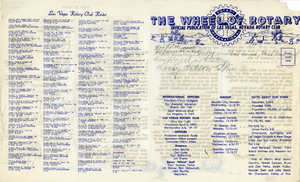
The Wheel of Rotary Las Vegas Rotary Club newsletter, December 29, 1949
Date
Archival Collection
Description
Text


